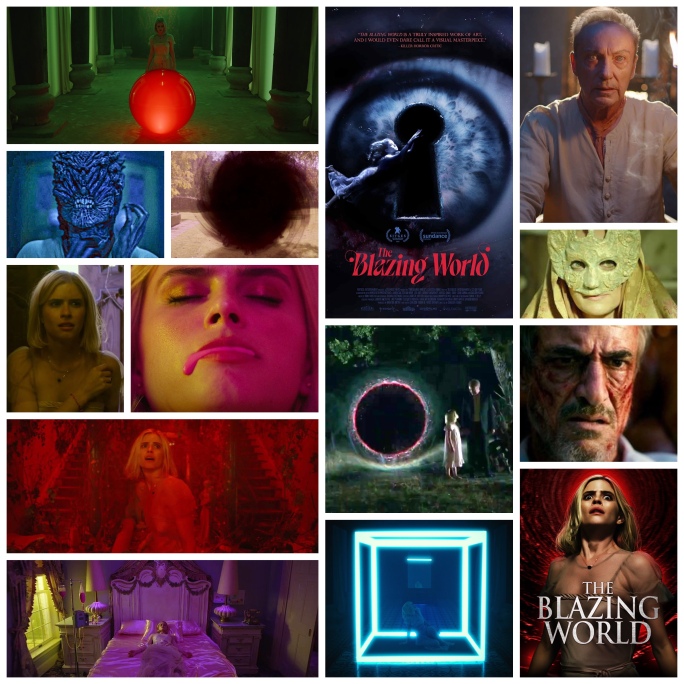
I can’t imagine what a challenge it must be to write, direct and star in your own feature debut, there are so many ways it can go wrong from being just too ambitious an undertaking to a scattershot vanity project, but Carlson Young blasts into the scene with her striking new film The Blazing World, as assured, unique and breathtaking embark on a creative journey in cinema as I’ve ever seen. The film opens with two twin sisters playing in the woods near a lavish house, while their troubled parents (Dermot Mulroney & Vinessa Shaw) have a ferocious domestic dispute within, interrupted by a fatal tragedy befalling one of their daughters, an event that will haunt the family forever and cause the grown up girl (Young) to be propelled in a hallucinatory, surreal, otherworldly voyage into dimensions of the soul and spirit worlds to work through the pain, mental turmoil and anguished memory from that time. This is a strange, disorienting film but Young commands the narrative so that as weird as it gets, it only skirts that realms of outright incomprehensible arthouse tendencies and still has roots in what feels… I don’t want to say ‘commercial’, but let’s go with ‘accessible.’ It’s still bizarre as all hell though, in the best possible way, a vividly prismatic burst of visual inspiration, deep fluttering colours and puzzling, baroque subconscious imagery, I was reminded of Tarsem Singh’s The Cell in both style and structure. As Young’s protagonist arrives for a visit at the family home for the first time in years she finds mom a despairing mess and dad a tornado of alcoholic depression, but that isn’t all she finds. A menacing supernatural stranger played by the one and only Udo Kier appears, beckoning her down a metaphysical rabbit hole into the netherworlds beyond waking life, a constantly shifting dream state of astral projection where she must face the memories that have haunted her for years, confront the tormented dream egos of her parents and even face her own sister eventually. It’s a darkly dazzling journey beyond time, thought and consciousnesses and who better than the always captivating Kier to host it, he rips into this role with a seething, wide eyed malevolence and Young, as both his actor and scene partner, lets him do some wild, intense stuff and go to some places I’ve never seen from him before. The stylistically audacious world she plunges into is brought to life by impossibly detailed production design, like a fine abstract painting with potent life breathed into it, a fearsome, dark fairytale musical score by Isom Innis with some effective classical music choices and incisive, alluring sound design. Young commands it all with unbelievable skill so early in the game, as an actor she has a sensitive heart and smouldering vulnerability hanging on every syllable, completely believable as this character. As a filmmaker she clearly shows she’s in love with her medium and has been influenced by some of the most striking artists, while boldly finding her own voice and presenting a debut that’s overflowing with lush creativity and a strong beating heart which, when you consider the amount of triple-threat labour and creativity has gone into it, is a staggering first time effort. Highly recommended, one of the most unique films this year.
-Nate Hill








